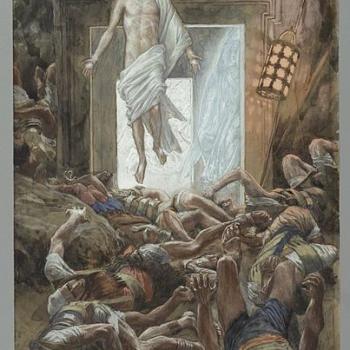Authority is important to Mormons, more so than perhaps for any other Christian religion. Probably few non-Mormons understand what it means to us or how it operates for us, so the chances for misunderstanding are huge. Those chances are increased by the fact that we ourselves often don't really understand how or when it is working, so we sometimes explain ourselves clumsily.
In an important sense, our understanding of authority is at the foundation of our self-understanding as a religion, and central to the social structure of the LDS Church as a community. Yet it is so much part of who we are that we may not even notice it.
To understand what authority means to us, starting with the way we understand authority when we talk with one another, our explanation of why authority is needed: Jesus gave his authority to the first apostles, and that authority was necessary for the ritual life of the Church, as in baptism. But after the death of Christ there was an apostasy, in other words, the loss of that authority.
Perhaps the best explanation of our claim of a wide apostasy is that for many reasons (difficulty of travel and communication, for example) as the first apostles died it became more and more difficult for there to be someone with the authority to continue to confer that authority on someone else. Authoritative ordinations became more and more difficult, and the Church "fled into the wilderness" (Rev. 12:6).
Of course ordinations continued, but they continued without the necessary authority. This wasn't the consequence of any plot by evil persons. It was the natural consequence of good people trying to maintain the Christian Church. They needed a new bishop in a city but no longer had the authority to ordain one. So they did what needed to be done to keep the Church going.
By Mormon lights, however, they didn't have the divinely authorized authority to do so. We can ask why our Heavenly Father would allow the Church to lose its priesthood, but we don't have an answer to that question. We believe that scripture foretold the fall of the early Church, as in 2 Thessalonians 2:3. But we don't know why it happened.
What, then, did the early Church lose? As Mormons understand divine authority, it is at least partly a matter of delegation. Without the permission of someone at the head of the Church, those with authority cannot confer it on others. So, with the death of the apostles came the eventual loss of priesthood authority. Apostles were necessary to the continued bestowal of that priesthood, but they were gone.
That isn't the only explanation of the apostasy that you'll hear from Mormons, but I think it is one that impugns the early Church the least, if at all. I'm skeptical of explanations that don't assume that the members of the first-century Church as well as those of the next centuries were at least as righteous (as well as unrighteous) as members of the contemporary Church.
Joseph Smith, the founding prophet of the Church of Jesus Christ of Latter-day Saints taught that because of the apostasy, the early Church needed to be restored. (As a result, sometimes Mormons refer to the LDS Church broadly as "the Restoration," a restoration marked by the suffix "of Latter-day Saints.") As much as anything else, the Restoration was a restoration of priesthood authority. Worthy Mormon males 12 years of age and older are eligible to have that authority. Almost all do, including me.
We have been delegated the power of God. The sheriff of a county delegates his authority to others; he deputizes them so that they can do what he has authority to do. Mormons understand priesthood authority in an analogous way: God has delegated his authority to the prophet of the Church; in turn, the prophet delegates it to others. We can baptize, for example, because having received authority from God, the prophet has delegated others (through ordination) and they have delegated still others (also through ordination) to perform baptisms.
Having been given the authority to baptize, I am God's deputy. In itself, that is a privilege difficult to comprehend. But though I do not fully understand why God would deputize me or any other human being to act in his name, I do understand authority as delegation, and I have priesthood authority because it has been delegated to me.
But what do I have in having that? The common formula among Mormons is that I have "the power to act in the name of God." Through the priesthood things happen, things get done that are beyond my mortal powers. I've seen the reality of that power, both when it has been manifest through others and when it has come as part of what I have done, for example in giving a blessing.





